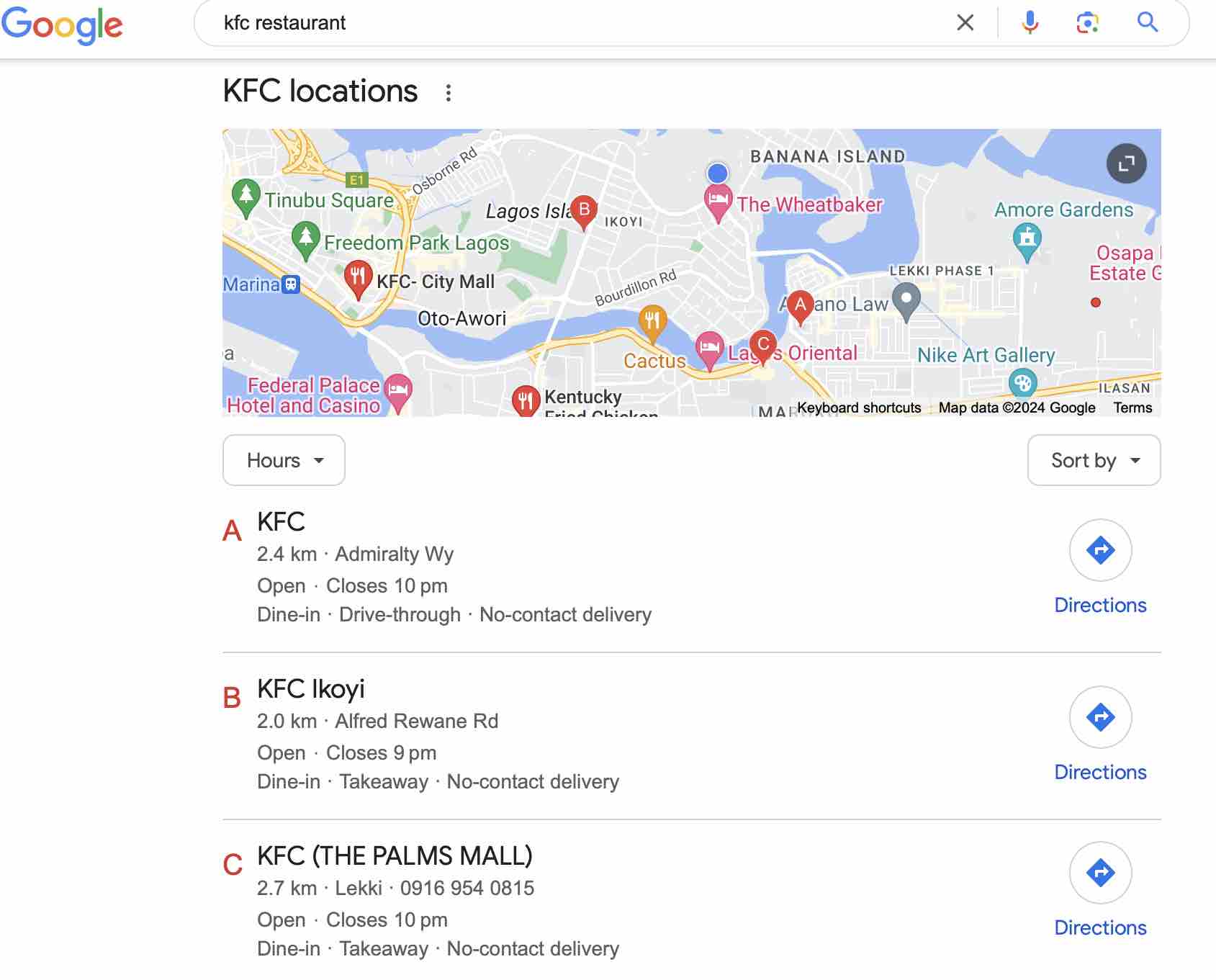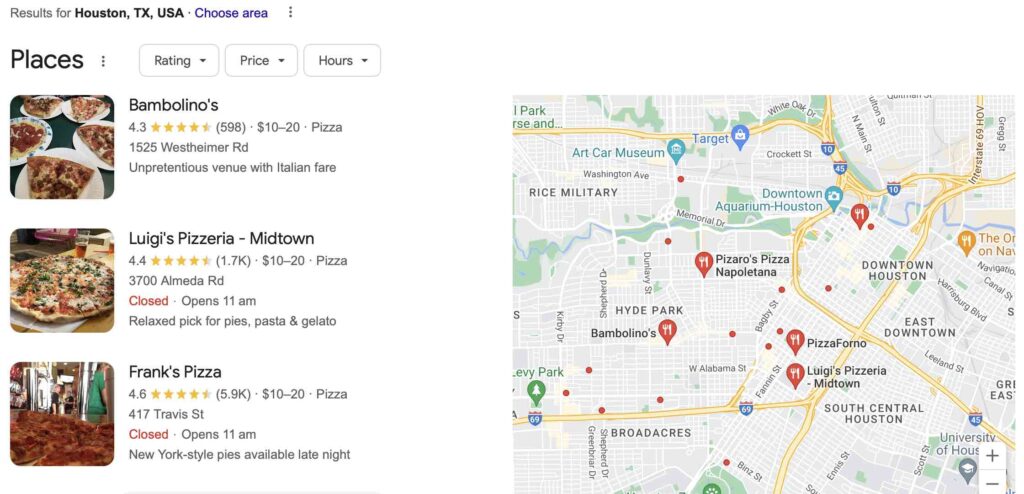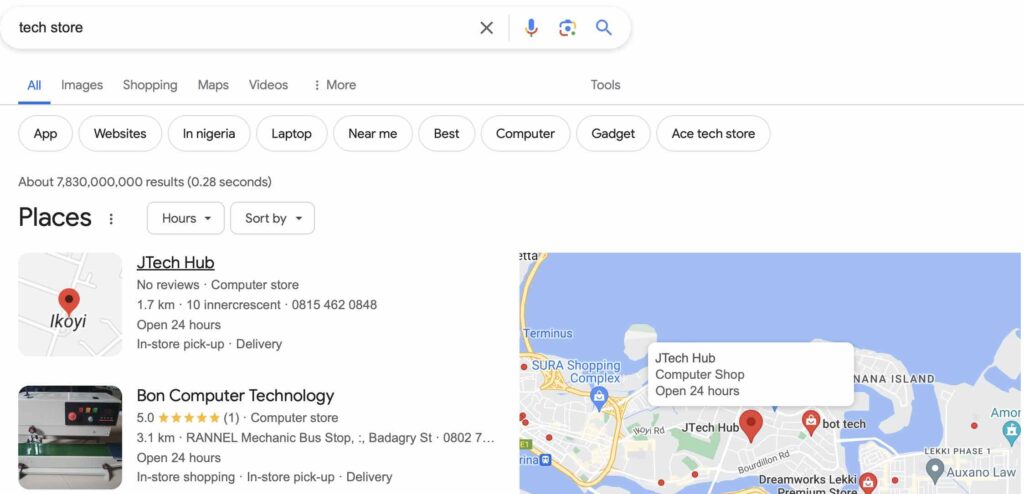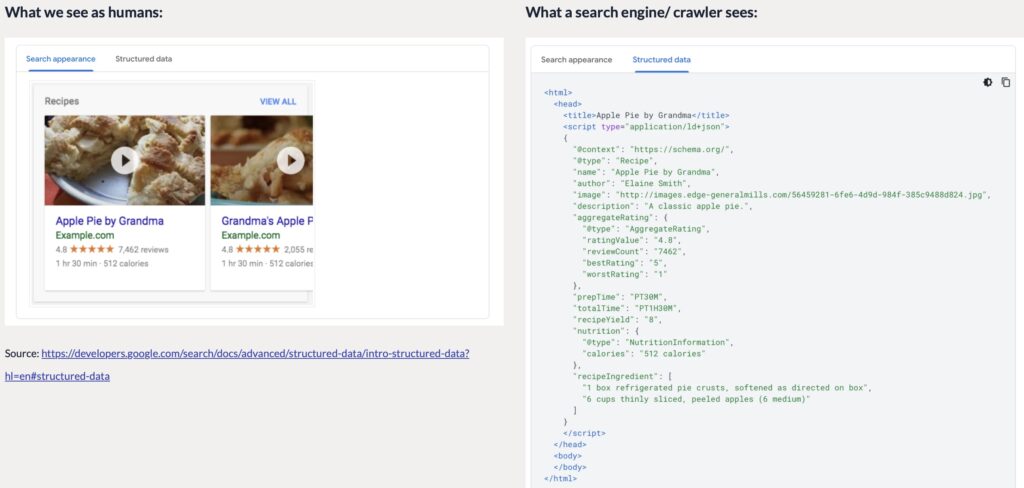I. Introduction
Definition of Local SEO
Local SEO is a search engine optimization strategy aimed at enhancing a business’s local visibility in local SERPs.
The central goal of local SEO keywords is to use geographically targeted keywords in the local search optimization of your business or your products and services within a defined locality when certain local SEO keywords that are peculiar to your defined area of business are keyed into the search engine bar as a search query.
Local SEO keyword strategy is unlike the traditional global SEO keyword strategy in the sense that it is not designed for a global or national audience but rather links you with customers and businesses that are within your geography.
Importance of Local SEO Keyword in Local Search Optimization:
Local SEO keywords are central to local search optimization of your website for local ranking in specific and targeted geographic locations.
They are central to improving the visibility of your website, attracting more foot traffic in the process, addressing the specific pain points of your target audience within your specific geographic area of business, improving your ranking in SERPs, and consequently increasing your customer engagement which translates to higher conversion rate optimization (CRO), repeat business patronage and lowering your cost of doing business.
Also by optimizing for local search, using local SEO keywords optimization tactics, you gain a competitive advantage as your local competitors may not be optimizing their content for local SEO keywords.
Local SEO keyword optimization is also cost-effective as it helps you target local audiences that have high buyer intent. This is an effective local SEO strategy that will lower your cost of advertising in particular and marketing in general.
Another important benefit of optimizing your local SEO keywords is that it helps you build local trust and reputation as an authority in your geographic area.
II. Understanding Local SEO Keywords
Expanded Definition of Local SEO Keywords?
Local SEO Keywords can also be described more broadly as keywords, phrases, or terms peculiar to a particular geographic location like towns, counties, or iconic places, like London Bridge, UK, or the Statue of Liberty, New York.
Use local SEO keywords as an effective local SEO strategy to help you optimize your website’s visibility and ranking in local SERP
How Do Local SEO Keywords Differ from Regular Keywords?
Local SEO keywords are geographically targeted keywords; however, regular SEO keywords may have national or worldwide relevance.
Suppose you were at your downtown business office and your lunchtime, you googled the phrase “pizza restaurant”, Google will list several pizza restaurants that are considerably closer to your downtown office. This makes sense because you will be more interested in pizza restaurants that are close to you.
Suppose again that you are resident at a considerable distance from your downtime office and you key in the same search phrase “pizza restaurant”, Google will produce a new list of pizza restaurants that may not contain any of the previous pizza restaurants listed for you in the SERPs at your downtown business office.
Again, this makes sense because geographic proximity will be a relevant factor in your decision to order a home-delivery pizza.
Local SEO keyword search is not a new concept in SERPs. However, the increasing use of mobile devices is what has catapulted it to new prominence. As of April 2021, Google holds over 92% of the search engine market worldwide. On average, over 5.6 billion searches are carried out on Google platforms per day. Over 50% of all searches are conducted using mobile devices by an audience constantly in motion from one place to another.
As the example above has demonstrated, there is a fundamental difference between local SEO keyword search and global SEO keyword search terms.
Specificity is central to local SEO keywords. This specificity could be geographic. Relevance is another key factor.
Regular or global SEO keywords search terms or phrases are usually broader in application for a wider audience; however, for geographically targeted keywords, local SEO Keywords incorporate location-based qualifiers such as:
- The name of a geographic location (for instance, Burger King in West London),
- The description of a neighborhood, for instance, the postal code (Burger King near SW7 1BT)
- A landmark (Burger King near London Bridge)
The essence of localization of SEO keywords is to ensure that your business appears prominently in search results when your target audience looks for your products or services in their immediate area.
For a local business seeking or targeting a local audience, local SEO keywords help you enhance your online presence and attract nearby audiences as demonstrated by the Pizza Restaurant example above.
As we previously stated, with over 60% of all searches done with mobile devices by a population that is constantly on the go, the emphasis today is on personalized search results. Therefore, optimizing for local SEO keywords can significantly improve your business’s:
- Organic visibility in SERPs,
- Help you drive organic website traffic to your site or your products and services, and
- Ultimately leads to higher conversion rates at a lower cost.
Understanding the subtleties of Local SEO Keywords and strategically incorporating them into your digital marketing efforts is an effective local SEO strategy.
Effectively connect with your local audiences to gain a competitive edge in your markets.
Implicit vs Explicit Local Keywords
Local SEO keywords could either be implicit or explicit.
Implicit local SEO keywords: These are local SEO keywords where no particular geographically targeted keywords are used in a search query.
Suppose you were at your downtown business office and keyed in “Pizza restaurant” in the search bar of your device, your search query will return Pizza restaurants near you though you did not include “near me” as a geographically targeted keyword in your search query.

5 Ways Google Determines Implicit Locations
- The Location of Your Device: Google can accurately determine where the device is being used for a local SEO keyword search query and will return a SERP that is geographically relevant to the location.
- Labeled Places: Google can utilize a device that has already been labeled in return for relevant results to a query.
- Your Saved Home Address: This is where Google My Business or Business profile is used to determine a device location.
- Your digital Footprint: We all have our digital footprint that is a result of our past Google activities. Or the device user may be at a cyber cafe and Google can determine the location by rendering relevant SERP.
- Your IP Address: Google is also able to utilize the IP address of the device user in rendering appropriate results to internet search queries
Explicit Local SEO Keywords: These are easy to understand because the search query explicitly names the geographic location of the search.
Examples:
- KFC in North London
- Pizza Place in Baltimore
- Winery near Eiffel Tower, Paris(a historic landmark)

III. Conducting Keyword Research
Tools for Keyword Research (Google Keyword Planner, SEMrush, etc.)
Identifying Local SEO Keywords Relevant to Your Business
For an effective local SEO keyword research, the following are the core steps:
Step 1: Compile a list of the core business solutions you provide:
Example: Suppose you were in the business of selling computer hardware in your locality, a list of the “what” of your business will include the following:
- Computer hardware: this keyword phrase covers computer components like CPUs, GPUs, RAM, Motherboards, and storage devices
- Local: this addresses the fact that your business is in a specific geographic location or region. In this case, use geographically targeted local keywords to target customers in your region that can provide customized services to.
- Tech store: This is a keyword phrase that indicates that your specialty is technology products, especially hardware components.
- Support: This indicates that you provide after-sale tech support like technical assistance, troubleshooting assistance, warranty support, and so on.
- Custom-built: This indicates that you provide personalized solutions and tech support, including customization and configuration of computer hardware.
- Community: This indicates that you intend to connect with and engage with your local community and form a strong business bond with members of your community.
You should now use some of the above listed “what” to do a Google search and note the top-ranking local SEO keywords that Google will generate for you in the SERPs. This will help you in the design of effective local SEO strategies.
Let us generate a local SEO keyword SERP from the phrase “tech store” as a search query (see the result below):

Step 2: The second step of the process of conducting local SEO keywords for your local business is to generate and add keyword modifiers and geographic locations to the list you have created.
It is important that the geographically targeted keywords that you generate are keywords with medium to large search volume and that they also have medium to low keyword competition.
It wouldn’t be too wise to compete with Apple Inc., HP computer manufacturers, and organizations in this top-tier group.
For instance, if “tech store” is your core local SEO keyword, a keyword modifier could be “Best Tech Store in Milton Keynes”. Modifiers help in optimizing for local search.
In the above example, “Best” is a modifier, and “Milton Keynes” is a local geographic location.
IV. Types of Local SEO Keywords
Keywords are the cornerstone of SEO. Without keywords, SEO will be meaningless as there will be no basis for ranking the relevance of a search query.
For an effective local SEO keyword strategy, you may choose to target your local audience by their geographic location, or by the type of service you render.
You may also decide to use long-tail keywords or short-tail keywords.
You may also decide to target your local audience by any combination of all three types of local SEO keywords.
Let us briefly discuss each of the three types of local SEO keywords.
Location-based Keywords:
In today’s digital landscape, mobile devices account for over 50% of all Google searches.
This is because lots of people are constantly in motion, traversing from one location to another, either between work and home or between home and entertainment hubs or out to visit friends and loved ones, and so on.
Google can geo-locate mobile devices and can also respond to location-based queries by using the IP address of the device.
If for instance, you key in the search query, “Burger King near me”, Google will produce a SERP list of localized location-based results of all Burger King restaurants near you.
In constructing location-based local SEO keywords for your website or your content, include location modifiers like city name, state, neighborhood, or landmark.
Product or Service-based Keywords:
These are keywords with high buyer intent because they specifically describe your products or services.
Long-tail product or service local SEO keywords usually have low search volume low competition and high conversion rate optimization (CRO). For instance, a short-tail local SEO keyword like “Restaurant” will have an extremely high search volume and high competitiveness. However, a long-tail loyal SEO keyword like “Pizza Restaurant Near Eiffel Tower” will have a comparatively low search volume and low competitiveness but a higher conversion rate optimization.
Short-Tail Keywords vs Long-Tail Keywords
Short-tail keywords: In Optimizing for local search, you may use either short-tail local SEO keywords or long-tail local SEO keywords, or even both types of keywords.
Short-tail keywords are one or two-word keywords, for instance, ‘Plumber’, ‘Restaurant’, and ‘Heater’ which have large search volumes and high competitiveness and are difficult to rank for in SERPs. Because they lack keyword modifiers, they are generally too broad keyword search terms and they have a very general application in many situations. Therefore, optimizing for local SEO keywords using short-tail keywords can be difficult and expensive.
Long-Tail Keywords: On the other hand, long-tail keywords are search queries with three or more words. They are longer and narrower search queries with lower search volumes and lower competitiveness.
Examples of long-tail keywords are:
“Family-friendly Italian restaurant with outdoor seating in downtown
“Chicago”
“Authentic Thai cuisine delivery near [specific neighborhood or landmark”
“Gluten-free brunch options for vegans in Los Angeles”
“Farm-to-table seafood restaurant with ocean views in coastal Maine”
“Date night dinner specials at a French bistro with live music”
“Late-night sushi bar open past midnight in Downtown Manhattan”
The examples above have both keyword modifiers like ‘gluten-free’, Late-night’, and geographic locations like ‘Los Angeles’, Maine’, and ‘Manhattan.’
V. On-Page Optimization for Local SEO Keywords
On-page optimization is pivotal in ensuring that your website ranks well for local search queries.
By strategically incorporating local SEO keywords into various on-page elements, you can signal to search engines the relevance of your content for specific geographical locations and improve your chances of appearing in local search results.
More specifically, attend to the following ranking factors:
1. Page Titles, Meta Descriptions, and Headers:
To optimize for local search your page titles, meta descriptions, and headers should include relevant local keywords.
You should ensure that these elements accurately reflect the content of your page while also incorporating location-based modifiers to enhance local relevance.
2. Content Optimization for Local Search
Integrate local SEO keywords naturally throughout your website content.
Write informative, high-quality content that addresses the needs and interests of your local audience while incorporating relevant location-based terms where appropriate.
3. Schema Markup for Optimizing for Local Search:

For an effective local SEO strategy, utilize schema markup to provide search engines with additional context about your business, such as:
- Your business location,
- Contact information about your business, and
- business hours.
In a sense, schema markup can be described as a machine-structured language that search engines understand in the form of code. It is the language search engines use for understanding, interpreting, and rendering instructions from human requests.
This structured data can enhance your website’s visibility in local search results and improve your chances of appearing in featured snippets or local pack listings.
By optimizing your website’s on-page elements for local SEO keywords, you can increase your visibility in local search results, attract more relevant traffic, and ultimately drive more conversions for your business.
VI. Off-Page Optimization for Effective Local SEO Strategy
Off-page optimization for local SEO keywords refers to all the activities that you must carry out outside your website that are designed to boost your ranking on SERP pages.
As part of creating an effective local SEO strategy, not all of your local SEO keyword optimization strategies can be executed online. There are certain search engine ranking activities and factors that you can perform offline to optimize for local search.
Those local SEO activities that you must perform outside your website to optimize your ranking in Google and other search engine result pages are collectively known as Off-page optimization.
These ranking factors include but are not limited to the following:
- Creating local listing
- Building citations with consistent name, address, and phone number (NAP), and
- Obtaining backlinks.
Creating Local Listings for Your Business:
There are many benefits of being listed in local directories in your business geographic location.
Metaphorically speaking, your business’s local listing in your geographic location can be likened to having a virtual storefront. Like a local storefront, you become more visible on the local search engine result pages.
Local listing is a key factor that Google and other search engines take into consideration in Local SERP ranking. Therefore, this improves the chances of your being found by prospective customers.
Another additional benefit of local listing is that it aids the brand awareness of your website and the products and services that you render to your local community.
However, for every listing, you must provide a consistent NAP (name, address, and phone number). This is generally referred to as NAP Citation.
Best Platforms for Local Business Listing:
There are many platforms for local business listing; however, the most popular platforms include:
- Google My Business
- Yelp.com
- Bing Places, and
- Facebook Business
Consistently and accurately ensure that your business information, including:
- name,
- address,
- phone number (NAP), and
- website URL,
VII. Tracking and Monitoring Local SEO Performance
Set up Google Analytics:
With Google Analytics 4, you can obtain useful data performance of key website metrics like traffic on your site, website dwell time, conversion rate optimization, and bounce rate of visitors to your site.
The longer a visitor to your site stays, the higher he or she will execute an action you desire. A high bounce rate means that you are not connecting with your website visitors.
You can also determine high-performing keywords and use more of them.
Track Local Keywords Ranking
You can also use several tools to determine the ranking of keywords in your local search engine ranking results.
Some of the popular tools include SEMrush, Moz, and Ahref. By observing these local keywords ranking periodically, you will continue to gain a deeper understanding of trends in your local market.
Monitor Website Traffic and Conversions
What is your conversion rate? What is the volume of traffic to your site? How many leads are you generating per period? With your analytics dashboard, you will discern the answers to these questions and determine what is working and what isn’t.
Analyze Customer Behaviour
With analytic tools like Google Analytics 4, and Facebook Analytics, you can observe how your customers interact with your website. For instance, the pages they visited, their dwell time, bounce rate, cart abandonment, repeat visits, and much more. With the data you collect from this trend analysis, you can make informed decisions that will make your content more relevant and increase customer engagement and purchases.
VIII. Common Mistakes to Avoid
While implementing local SEO strategies, it’s crucial to be aware of common pitfalls that can hinder your efforts and negatively impact your online visibility.
By avoiding these mistakes, you can ensure that your local SEO campaigns are effective and yield optimal results.
Keyword Stuffing:
When writing your content, adopt a human reader-first approach and write conversationally as if you were writing an email.
Keyword stuffing is an unnatural piece of content that is not user-friendly and that attracts Google and other search engine sanctions.
Here is an example of keyword stuffing, courtesy of webfx.com:
“Get a yellow rubber ducky for your children. A yellow rubber ducky is a charming toy, so buy a yellow rubber ducky today. With a yellow rubber ducky , you can have tons of yellow rubber ducky fun. It’s easy to make bath time great with a yellow rubber ducky , and a yellow rubber ducky from our company guarantees yellow rubber ducky enjoyment.” – Courtesy of webfx.com
– Courtesy of webfx.com
In the example above, the keyword phrase is “yellow rubber ducky” and it was used eight times in a 61-word content.
Suppose you were writing content and your primary keyword is “The Statue of Liberty”, write as naturally as you can, perhaps, write conversationally for human consumption. Then strategically insert your primary keyword at points in your essay where they fit naturally. Do not attempt to game Web Crawlers. They as sophisticated enough to dictate keyword stuffing and your site ranking will be downgraded or banned altogether.
Neglecting NAP Consistency:
As we stated previously in this article, there are many popular platforms for local listing of your business. These platforms include the following:
- Google My Business (now called Google Business Profile)
- Yelp.com
- Bing Places, and
- Facebook Business
On these platforms, you must list your business name, business address, and business phone number (NAP). Consistency in NAP listing across all platforms is key for several reasons:
- NAP is used by search engines to verify and confirm the credibility of your business.
- NAP is what search engines use for displaying your business information. Therefore an inconsistent or inaccurate NAP error may confuse search engines.
- An inaccurate NAP listing may lower your search engine ranking and this will affect the capacity of your prospective customers’ ability to locate you.
For the above reasons, regularly monitor and audit your online presence and mention so that errors are discovered and corrected early.
IX. Tips for Success with Local SEO Keywords
Achieving success with local SEO keywords requires a strategic approach and ongoing effort to optimize your online presence effectively.
Here are some tips to help you maximize the impact of your local SEO efforts:
Regularly Update Local Listings:
Keep your business listings on platforms like:
- Google My Business (now called Google Business Profile)
- Yelp.com, and
- other local directories up-to-date with accurate information, including your:
- business hours,
- contact details, and
- address.
Regular updates signal to search engines that your business is active and relevant.
Encourage Customer Reviews:
Actively encourage satisfied customers to leave positive reviews on platforms like:
- Google My Business (now called Google Business Profile)
- Yelp.çøm, and
- Facebook.
Positive reviews not only enhance your online reputation but also improve your visibility in local search results
Stay Engaged with the Local Community and Events:
Participate in local events, sponsor community initiatives, and engage with local organizations to increase your visibility and establish your business as an integral part of the community.
By implementing these tips and staying committed to refining your local SEO strategy over time, you can strengthen your online presence, increase your visibility in local search results, and ultimately drive more traffic and conversions for your business
X. Conclusion
- Recap of the Importance of Local SEO Keywords
- Final Tips for Beginners
- Encouragement to Start Implementing Local SEO Strategies



